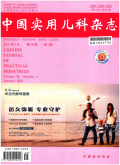中国实用儿科杂志2024,Vol.39Issue(6):444-448,5.DOI:10.19538/j.ek2024060608
Ⅰ型干扰素病研究进展
Research progress of type Ⅰ interferonopathy
摘要
Abstract
Type Ⅰ interferonopathy is a group of novel diseases characterized by excessive upregulation of type Ⅰ interferons due to specific gene mutations,leading to systemic multi-systemic inflammatory reactions.This article reviews recent research progress in the pathogenesis,disease types,and therapeutic advances of type 1 interferonopathy.It highlights key pathogenic mechanisms such as abnormalities in nucleic acid sensing pathways and various new type 1 interferonopathies including ARF1 defects,STAT2 loss-of-function mutations,JAK1 gain-of-function mutations,ATAD3A mutations,and RELA mutations.Although evidence-based therapeutic strategies are currently lacking,treatments such as glucocorticoids,anti-IL-1,anti-IL-6,anti-interferon receptor therapies,and JAK inhibitors can partially alleviate disease progression.关键词
干扰素病/自身炎症/研究进展Key words
interferonopathy/autoinflammation/research progress分类
医药卫生引用本文复制引用
于仲勋,高思豪,马明圣..Ⅰ型干扰素病研究进展[J].中国实用儿科杂志,2024,39(6):444-448,5.基金项目
国家重点研发计划(2021YFC2702001) (2021YFC2702001)
北京协和医院中央高水平医院临床科研专项(2022-PUMCH-B-079) (2022-PUMCH-B-079)

